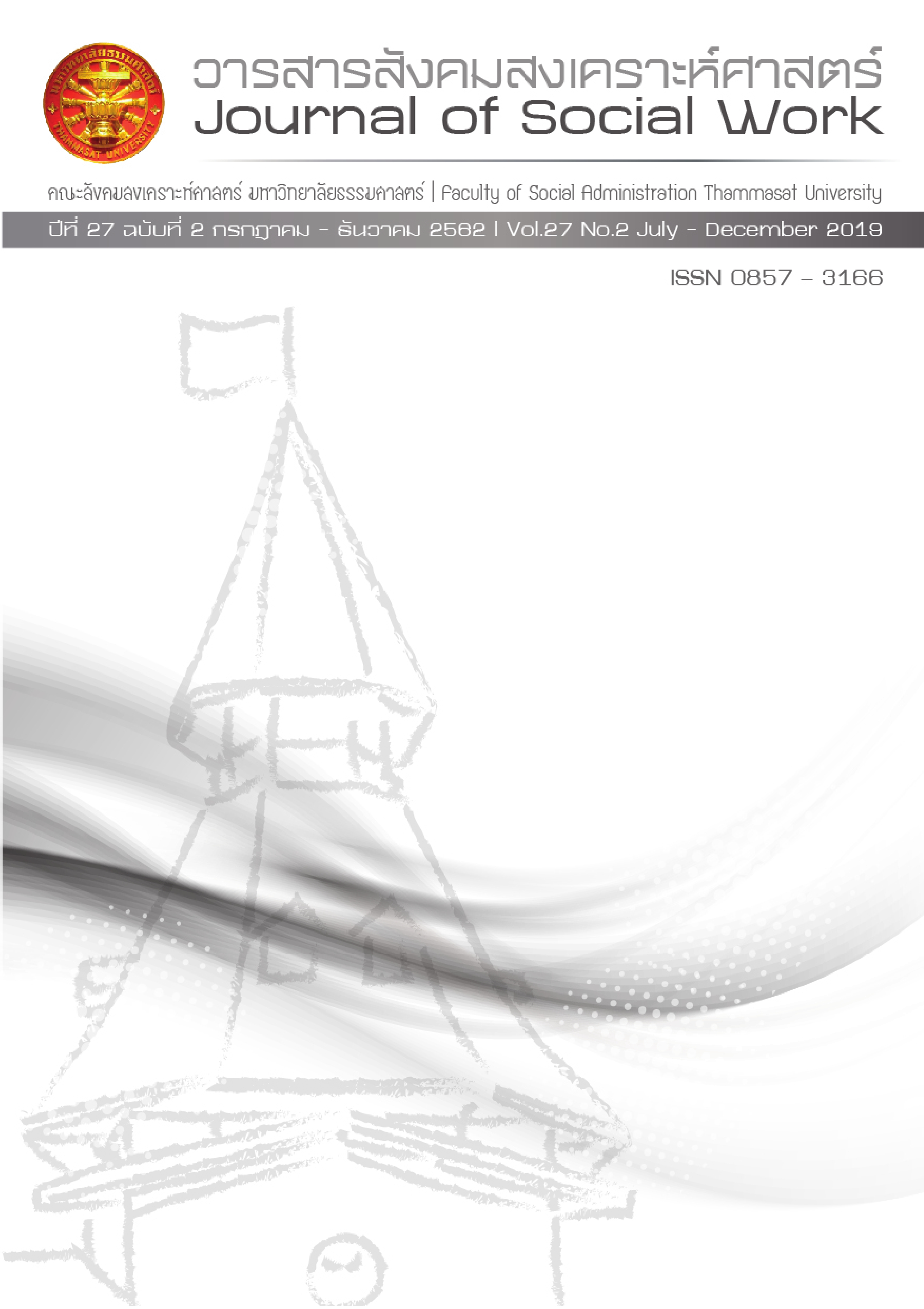The Changing Status of Lisu Man under the Expansion of Chinese Tourists in Pai District, Mae Hong Son Province
Keywords:
Lisu Men, Tourism, Gender, Chinese TouristsAbstract
The Lisu women and men in the context of tourism have a very modest status. Tourism has pulled Lisu women from the household area to the tourist market area, which is a public area. This change of status has a profound effect on the Lisu man, who was originally a public figure and a leader in the family, the main decision maker. This change is due to the use of the tourist area as a market for the cultural products, which is related to the women. However, the expansion of tourism aimed at increasing the number of Chinese tourists, has become an important channel for reintegration into the role of Lisu man. In addition to the expansion of Chinese investors who have expanded with Chinese tourists, also under the Investment Law for Foreigners in Thailand, there are loopholes. Being married to a Thai national is a great option for Chinese women. Language skills and space in the tourist area make Lisu men the prime choice of these business people. To be marriage with the Chinese business women is not only an economic gain, but the status of the Lisu man's household again. This article demonstrates that the power of women and men in the household is always changing, depending on the context and exploitation of both women and men.
References
กรวรรณ สังขกรและคณะ.(2560). รายงานฉบับสมบูรณ์แผนการวิจัย การพัฒนาและส่งเสริมการท่องเที่ยว: ตลาดนักท่องเที่ยวจีน. เชียงใหม่ : สถาบันวิจัยสังคม มหาวิทยาลัยเชียงใหม่ เสนอกองทุนสนับสนุนการวิจัย.
ดวงใจ หล่อธนวณิชย์. (2550). รัฐ ทุน ชุมชน กับการจัดการการท่องเที่ยวที่ยั่งยืน: ศึกษาเปรียบเทียบระหว่างไทยกับญี่ปุ่น. วิทยานิพนธ์ปรัชญาดุษฎีบัณฑิต. วิทยาลัยสหวิทยาการ สาขาสหวิทยาการ. มหาวิทยาลัยธรรมศาสตร์.
ชัยยุทธ ถาวรานุรักษ์. (2554). การท่องเที่ยวประตูสู่ความปรับเปลี่ยนสถานะของผู้หญิงลีซอ. วารสารปาริชาต. ปีที่ 24 ฉบับที่ 1 (เม.ย.-ก.ย. 2554 ). หน้า 37-54.
ยศ สันตสมบัติ. (2557). มังกรหลากสี: การขยายอิทธิพลเหนือดินแดนและพันธกิจเผยแผ่อารยธรรมในอุษาคเนย์. เชียงใหม่: ศูนย์ศึกษาความหลากหลายทางชีวภาพและภูมิปัญญาท้องถิ่น เพื่อการพัฒนาที่ยั่งยืน คณะสังคมศาสตร์ มหาวิทยาลัย เชียงใหม่.
สุชาดา ทวีสิทธิ์. (บรรณาธิการ). (2547). เพศภาวะ : กระบวนทัศน์เพื่อโลกใบใหม่ที่เท่าเทียมใน เพศภาวะ: การท้าทายร่างการค้นหาตัวตน. เชียงใหม่: ศูนย์สตรีศึกษา คณะสังคมศาสตร์ มหาวิทยาลัยเชียงใหม่.
อรัญญา ศิริผล. (ม.ป.ป.). ผู้ประกอบการจีนรุ่นใหม่กับความมั่นคงด้านธุรกิจท่องเที่ยวในภาคเหนือ วารสารประชาคมวิจัยออนไลน์ ฉบับที่ 132 น.15. สืบค้นเมื่อวันที่ 1 พฤศจิกายน 2561. http://rescom.trf.or.th/display/keydefault.aspx?id_ colum=3541.
กรุงเทพธุรกิจ (ออนไลน์). (2558, กรกฎาคม 3). “ทุนจีน” บุกเชียงใหม่ลุยซื้อ “อสังหาฯ. หนังสือพิมพ์กรุงเทพธุรกิจ. สืบค้นเมื่อวันที่ 22 มีนาคม 2561. http://www. home.co.th/hometips/detail/81305.
ลภัส อัครพันธุ์. (2561). นักท่องเที่ยวจีนยังแกร่งแม้เศรษฐกิจชะลอตัว. สืบค้นเมื่อวันที่ 2 กันยายน 2561. https://www.scbeic.com/th/detail/product/1936.)
MGR Online. (2559, มีนาคม 16).“ชี้จีนแห่ลงทุนเชียงใหม่ส่งผลดีแต่ต้องใช้ กม.คุมให้ท้องถิ่นได้ประโยชน์จริง” สืบค้นวันที่ 22 มีนาคม 2561. https://mgronline. com/local/detail/9590000027558.
ThaiPBS. (2560). สัมภาษณ์พิเศษ เหริน ยี่เซิง กงสุลใหญ่แห่งสาธารณรัฐประชาชนจีนประจำเชียงใหม่. สืบค้นเมื่อวันที่ 2 กรกฎาคม 2561. https://www. citizenthaipbs.net/node/20819.
DAI Bin, JIANG Yiyi, YANG Liqiong, and MA Yiliang. (2013). Stage characteristics and policy choices of China's outbound tourism development. Tourism Tribune, 28(1), P.39–45.
Mackie,J.(1993). Changing Patterns of Chinese Big business in Southest Asia’s In R.McVey, ed., Southest Asian Studies, University of Hong Kong.
Rodding, S.G. (1990). The spirit of Chinese capitalism. Berlin: De Gruyter.
Wolfgang George ARLT. (2006). China’s Outbound Tourism. Routledge 270 Madison Ave, New York, NY. P.124
Published
How to Cite
Issue
Section
License
The manuscripts published in the Social Work Journal is the copyright of the Social Work Journal, Thammasat University
Any article or opinion appeared in the Social Work Journal will solely be under the responsibility of the author The Faculty of Social Administration, Thammasat University and the editors do not need to reach in agreement or hold any responsibility.



